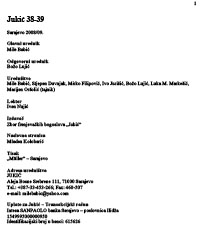Škotova metafizika slobode
Scotus' Metaphysics of freedom
Author(s): Mile BabićSubject(s): Metaphysics, Philosophy of Middle Ages
Published by: Franjevačka teologija Sarajevo
Keywords: John Duns Scotus; metaphysics; freedom;
Summary/Abstract: Scotus transforms metaphysics as onto-theology into ontology, meaning that the first that is known is not the Supreme (divine) being but the being as such. Metaphysics as the science of the Transcendent is transformed into transcendental science that speaks about the concept of being as such and about the transcendental characteristics of being as such. To the transcendental characteristics in Scotus belong not only convertible transcendentals but also disjunctive transcendentals that can be divided into contradictory (contingency-necessity, finiteness-infinity) and correlative transcendentals. To the correlative transcendentals belong pure perfections (perfectiones simpliciter) and the most important of them are intellect and will. Because the will in Scotus is the principle of free action, it is the proof that freedom belongs to the transcendental characteristics of being. Because in Scotus intellect – belonging to the nature – is the principle of necessary action, and the will is the principle of free action, and because in Scotus freedom is nobler than necessity (“haec enim nobilior est contingentia necessitate”), this proves that Scotus' metaphysics is the metaphysics of freedom and not the metaphysics of necessity. The goal of metaphysics as transcendental science is the knowledge of infinite being. This proves that transcendental concepts are intentional, that they are directed to reality. Scotus proves that the Supreme (Highest) being acts freely and that each of God's actions is a free action (“perfectionis est in Deo nihil necessario causare”) overcoming thereby the metaphysics of necessity of that period. Everything that is logically possible, that is not in contradiction with being, the will of God (freedom) can transform into reality. In this way it is said that Scotus does not accept freedom as voluntarism. In this way the metaphysics of possibility and the metaphysics of freedom go inseparably together. God's freedom is the presupposition of human freedom (“omne efficere erit contingens, quia dependet ab efficientia primi quae est contingens”) and because God is Freedom, the access to God is possible only through freedom. The highest form of freedom in Scotus is charity. Freedom is more perfect if it comes out of the being that is more perfect and if it is directed to the being that is more perfect. By this understanding of freedom Scotus transcends the modern philosophy of freedom.
Journal: Jukić
- Issue Year: 2009
- Issue No: 38-39
- Page Range: 105-124
- Page Count: 20
- Language: Croatian
- Content File-PDF

